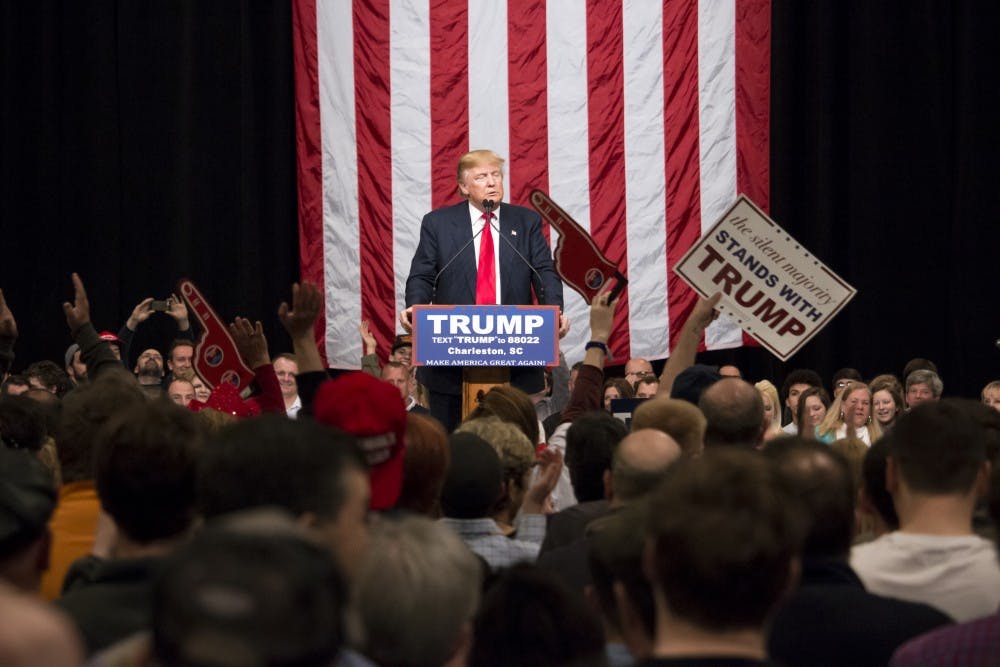
1968 Wharton graduate Donald Trump scored major victories on Super Tuesday.
Credit: Julio Sosa1968 Wharton graduate Donald Trump is barreling toward the Republican nomination, securing Super Tuesday victories in Alabama, Arkansas, Georgia, Massachusetts, Tennessee, Vermont and Virginia. He’s brash, offensive and highly divisive — yet he strikes a chord with a significant number of Americans.
But Trump’s support does not necessarily reach Americans in college. Interviews with college students at Trump events in South Carolina around its primary two weeks ago, and at the University of South Carolina reveal that the youngest cohort of American voters — even in a more conservative state — often disavow Trump’s views or regard him as a joke.
At Penn, Trump’s support is negligible. If it exists at all, it’s been silenced by the overwhelming liberal lean of campus and the tendency of conservatives to support establishment candidates like Marco Rubio and John Kasich. The short-lived Penn for Trump student group disbanded early this year after its founder decided he didn’t agree with Trump’s proposals to ban Muslims from entering the country. And at the Penn Caucus on Feb. 1, Trump didn’t see a single supporter.
But even in South Carolina, which overall, is far more conservative than an elite college campus in Philadelphia, Trump’s impact is unclear.
Twenty-two-year-old Troy Hagin attended a Trump rally in Charleston the day before the South Carolina primary because “it was an opportunity to see something cool.” He was joined by his friend, Happy Anmidan, a 19-year-old who “just wanted to see the full experience.”
Neither is planning on voting for Trump.
And 19-year-old Kayla Tripp, who was at the same rally, had never been to a political rally before and wasn’t sure who she planned on supporting. But Trump left her unimpressed.
“I was hoping for something more — more statistics, more facts, instead of the stuff that he was just pulling out of thin air,” she said. “What about the jobs? What about abortion? ... Instead of this wall ... and Mexicans.”
At Trump’s South Carolina victory party the next night, young people were nearly impossible to find among the primarily white, middle-aged crowd of supporters. But one, 21-year-old Jared Kidings, cited Trump’s genuine voice as a reason for his strength as a candidate.
“I want to see my next president,” he said. “He tells it like it is.”
While Trump’s authenticity appeals to a wide range of voters, his lack of concrete policy plans and racially-charged views make him difficult for educated voters — especially young ones — to get behind. A January CNN poll found that only 26 percent of GOP voters with college degrees supported Trump, compared to 39 percent overall. And although the Republican party’s non-college educated wing has rallied around Trump, its educated wing remains divided.
Trump’s lead in the polls certainly isn’t echoed at the University of South Carolina, where the conservative presence rivals if not outweighs the liberal one. Of over 20 students interviewed on the day of the primary — most of whom planned to vote Republican — not a single one declared support for Trump.
Cole Houghton, a USC student from Atlanta, said he plans to vote Republican but only supports Trump “sarcastically.” When it comes to his serious opinions, Trump isn’t even an option.
“I don’t like Trump, just because he’s arrogant,” Houghton said. “You can’t run a business the same way you run a country ... Numbers aren’t the same as people. Most of his talk has been about foreign affairs, but not very much about domestic affairs.”
And Katie McCarthy, a USC freshman who initially didn’t see Trump as a viable candidate, is unnerved by the support he has inspired.
“I feel like it’s weird ... I thought it was a joke that he was running — that Donald Trump was running for president. So it’s kind of weird that it’s going so well for him,” she said. “I just don’t think I ever really thought of him as a serious candidate, but the fact that he’s doing so well makes me cry for America a little bit.”
The Daily Pennsylvanian is an independent, student-run newspaper. Please consider making a donation to support the coverage that shapes the University. Your generosity ensures a future of strong journalism at Penn.
DonatePlease note All comments are eligible for publication in The Daily Pennsylvanian.




